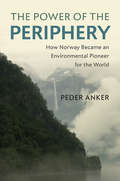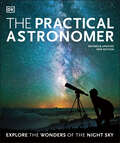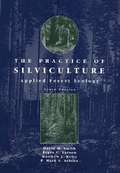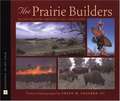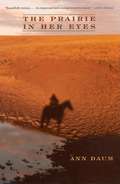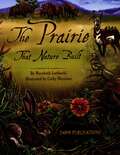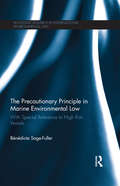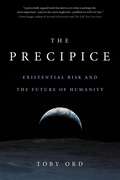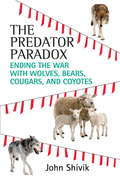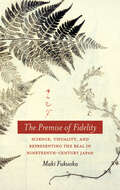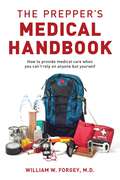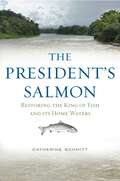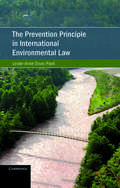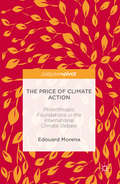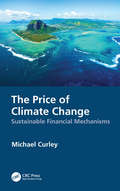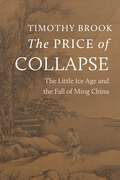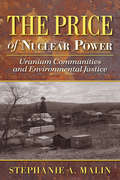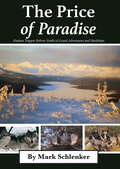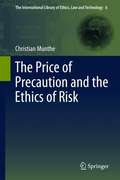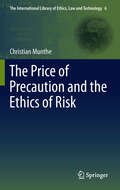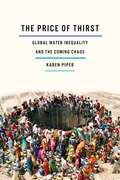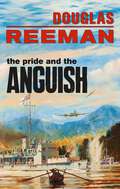- Table View
- List View
The Power of Wind (Into Reading, Level P #68)
by Jill Bryant<p>NIMAC-sourced textbook. <p>Wind is moving air. People make use of wind for transport and recreation, and as a source of renewable energy. In the future, wind power is expected to provide a large part of the world's electricity supply. <p>Wind is also a key factor in extreme weather events, such as tornadoes and hurricanes. People study the wind in order to use its power for energy, and to protect homes and infrastructure from damaging windstorms.</p>
The Power of the Periphery: How Norway Became an Environmental Pioneer for the World (Studies in Environment and History)
by Peder AnkerWhat is the source of Norway's culture of environmental harmony in our troubled world? Exploring the role of Norwegian scholar-activists of the late twentieth century, Peder Anker examines how they portrayed their country as a place of environmental stability in a world filled with tension. In contrast with societies dirtied by the hot and cold wars of the twentieth century, Norway's power, they argued, lay in the pristine, ideal natural environment of the periphery. Globally, a beautiful Norway came to be contrasted with a polluted world and fashioned as an ecological microcosm for the creation of a better global macrocosm. In this innovative, interdisciplinary history, Anker explores the ways in which ecological concerns were imported via Rachel Carson's Silent Spring in 1962, then to be exported from Norway back to the world at the Earth Summit in Rio de Janeiro in 1992.
The Practical Astronomer: Explore the Wonders of the Night Sky
by Will GaterDiscover the wonders of the Universe with this complete introduction to observing and understanding the night sky.This practical guide explains and demystifies stargazing, teaching you to recognize different kinds of objects and showing you how they move through the sky over the course of the night and the year. It shows you how to understand and enjoy the cosmos, building your practical astronomy skills from the basics to more advanced techniques.Beginning with an explanation of the Universe itself - how big is it, what shape is it, how old is it, and will it end? - it then takes you on a tour around the night sky, building up your knowledge in simple stages. Practical advice begins with naked-eye observations, then illustrated step-by-step instructions show you how to set up and use binoculars and telescopes and how to take your own pictures of the night sky. It also lets you take a closer look at the different objects you can view in the night sky, telling you how to train your eye to recognize basic patterns of stars (constellations) and how to tell planets apart from other celestial bodies, showing you how to observe them in an innovative step-by-step way. An atlas of the night sky is also included, with charts that can be used in both the northern and southern hemispheres throughout the year.Accessible, inspirational, and authoritative, The Practical Astronomer will enthuse and inform anyone who wants to expand their knowledge of the night sky.
The Practice of Silviculture: Applied Forest Ecology (Ninth Edition)
by Mark S. Ashton Matthew J. Kelty Bruce C. Larson David M. SmithChapters in this hefty textbook will be of interest to those who live near forests especially when those forests become threatened by big industry and politicians. Why do Californians argue about controlled burns? Why are folks in heavily forested Western states protesting some methods of logging? Why do Alaskans fight to keep wildlife preserves from shrinking? Anyone fighting to save a forst, a waterway, or an animal and its habitat will find helpful information and clear explanations of procedures and their consequences.
The Prairie Builders: Reconstructing America's Lost Grasslands
by Sneed B. CollardBarely a century ago a vast tallgrass prairie covered America's heartland. Bison, elk, coyotes, and bear roamed this wilderness. Hundreds of species of prairie plants supported an explosion of birds and insects, including hundreds of kinds of butterflies. By the early part of the twentieth century, however, the tallgrass prairie was gone, its rich soils converted to farms to feed a growing world population. Here, author Sneed B. Collard III tells the remarkable story of an effort to bring back part of the native tallgrass prairie. By following scientists who are working on the 8,000-acre Neal Smith National Wildlife Refuge in Iowa, readers will learn where the vision for a new prairie came from and how a dedicated group of scientists and volunteers is working to turn this vision into reality, from locating seeds of native prairie plants to using fire to drive out weeds to "bringing home" bison, elk, and one of the prairie's most spectacular butterflies, the Regal Fritillary.
The Prairie Dog Town (Animal Life Stories)
by Don Arthur TorgersenMeet prairie dogs in this science based story. Find out how they build their homes, what animals are their friends or enemies, what they eat, how they grow up, how they spend their days and nights and much more.
The Prairie in Her Eyes (The World as Home)
by Ann DaumFraming her recollections with the passage of cranes over her South Dakota ranch, Daum writes about the difficulties of living in a remote place--a fickle river, rattlesnakes, hospitals too far away to be much use, social isolation--but also what keeps her there--the cranes, the rhythms of the land & seasons, her horses, the bonds of family. Unflinching and understated, Daum breaks the silence that for too long has marked (and marred) the lives of western women. Her essays start in the present (she raises sport horses on a piece of what was a 13,000 acre spread) and cycle back through her childhood, with stories about her father, blizzards, a coyote, the White River that whipsaws their land, the differences between people, and the artifacts left by others who have tried to scrape a living out of the land. With humor and insight, her essays touch on different aspects of rural life and convey her vision for a good life in the west.
The Prairie that Nature Built
by Marybeth LorbieckiNature on the prairie, including both wildlife and wildfire, is a rich and closely knit ecosystem, as reflected in the interlocking verses of this simple story. Endnotes present facts, activities, related games, and resources
The Precautionary Principle in Marine Environmental Law: With Special Reference to High Risk Vessels (Routledge Research in International Environmental Law)
by Bénédicte Sage-FullerThe book examines whether the jurisdiction of coastal States under international law can be extended to include powers of intervention towards vessels posing a significant risk to their coastal and marine environment, but which have not yet been involved in any incident or accident. The books sets out how it is that coastal State jurisdiction can indeed be seen as including powers of intervention towards High Risks Vessels before an incident or accident happens, on the basis of the precautionary principle. The precautionary principle requires taking action when a risk of damage to the environment is suspected, but cannot be confirmed scientifically.The book thus considers the potential opportunities for the coastal state under international law to regulate international shipping where they consider vessels to an unacceptable risk to the environment, in order to prevent or minimise the risk of occurrence of the accident or incident leading to damage. The book acknowledges that this puts into question some very old and established principles of the law of the sea, most importantly the principle of freedom of navigation. But Bénédicte Sage-Fuller contends that this change would itself be a consequence of the evolution, since the end of WWII, of on the one hand international law of the sea itself, and of international environmental law on the other hand.
The Precipice: Existential Risk and the Future of Humanity
by Toby OrdThis urgent and eye-opening book makes the case that protecting humanity's future is the central challenge of our time. If all goes well, human history is just beginning. Our species could survive for billions of years - enough time to end disease, poverty, and injustice, and to flourish in ways unimaginable today. But this vast future is at risk. With the advent of nuclear weapons, humanity entered a new age, where we face existential catastrophes - those from which we could never come back. Since then, these dangers have only multiplied, from climate change to engineered pathogens and artificial intelligence. If we do not act fast to reach a place of safety, it will soon be too late. Drawing on over a decade of research, The Precipice explores the cutting-edge science behind the risks we face. It puts them in the context of the greater story of humanity: showing how ending these risks is among the most pressing moral issues of our time. And it points the way forward, to the actions and strategies that can safeguard humanity. An Oxford philosopher committed to putting ideas into action, Toby Ord has advised the US National Intelligence Council, the UK Prime Minister's Office, and the World Bank on the biggest questions facing humanity. In The Precipice, he offers a startling reassessment of human history, the future we are failing to protect, and the steps we must take to ensure that our generation is not the last.
The Predator Paradox
by John ShivikAn expert in wildlife management tells the stories of those who are finding new ways for humans and mammalian predators to coexist. Stories of backyard bears and cat-eating coyotes are becoming increasingly common--even for people living in non-rural areas. Farmers anxious to protect their sheep from wolves aren't the only ones concerned: suburbanites and city dwellers are also having more unwanted run-ins with mammalian predators. And that might not be a bad thing. After all, our government has been at war with wildlife since 1914, and the death toll has been tremendous: federal agents kill a combined ninety thousand wolves, bears, coyotes, and cougars every year, often with dubious biological effectiveness. Only recently have these species begun to recover. Given improved scientific understanding and methods, can we continue to slow the slaughter and allow populations of mammalian predators to resume their positions as keystone species? As carnivore populations increase, however, their proximity to people, pets, and livestock leads to more conflict, and we are once again left to negotiate the uneasy terrain between elimination and conservation. In The Predator Paradox, veteran wildlife management expert John Shivik argues that we can end the war while still preserving and protecting these key species as fundamental components of healthy ecosystems. By reducing almost sole reliance on broad scale "death from above" tactics and by incorporating nonlethal approaches to managing wildlife--from electrified flagging to motion-sensor lights--we can dismantle the paradox, have both people and predators on the landscape, and ensure the long-term survival of both. As the boundary between human and animal habitat blurs, preventing human-wildlife conflict depends as much on changing animal behavior as on changing our own perceptions, attitudes, and actions. To that end, Shivik focuses on the facts, mollifies fears, and presents a variety of tools and tactics for consideration. Blending the science of the wild with entertaining and dramatic storytelling, Shivik's clear-eyed pragmatism allows him to appeal to both sides of the debate, while arguing for the possibility of coexistence: between ranchers and environmentalists, wildlife managers and animal-welfare activists, and humans and animals.
The Premise of Fidelity: Science, Visuality, and Representing the Real in Nineteenth-century Japan
by Maki FukuokaThe Premise of Fidelityputs forward a new history of Japanese visuality through an examination of the discourses and practices surrounding the nineteenth century transposition of "the real" in the decades before photography was introduced. This intellectual history is informed by a careful examination of a network of local scholars-from physicians to farmers to bureaucrats-known as Shohyaku-sha. In their archival materials, these scholars used the termshashin(which would, years later, come to signify "photography" in Japanese) in a wide variety of medical, botanical, and pictorial practices. These scholars pursued questions of the relationship between what they observed and what they believed they knew, in the process investigating scientific ideas and practices by obsessively naming and classifying, and then rendering through highly accurate illustration, the objects of their study. This book is an exploration of the process by which the Shohyaku-sha shaped the concept of shashin. As such, it disrupts the dominant narratives of photography, art, and science in Japan, providing a prehistory of Japanese photography that requires the accepted history of the discipline to be rewritten.
The Prepper's Medical Handbook
by William Forgey M.D.The basis of adequate prepping is being prepared for both common and dire events that may occur under the worst of all possible circumstances. These circumstances might include the breakdown in normal emergency support services (such as calling 911), the lack of an ability to obtain additional supplies, and the probability that you will not be able to rely on anyone but members of your immediate group or yourself.Prepping requires forethought with regard to food, water supplies, power, and protection – all areas of significant technical preparation. Self-reliant medical care is no exception. This book provides the basis of prevention, identification, and long-term management of survivable medical conditions and can be performed with minimal training. It helps you identify sources of materials you will need and should stock-pile, it discusses storage issues, and directs you to sources for more complex procedures that require advanced concepts of field-expedient techniques used by trained medical persons such as surgeons, anesthesiologists, dentists, or midwifes and obstetricians.
The President's Salmon: Restoring the King of Fish and its Home Waters
by Catherine SchmittEvery spring, for thousands of years, the rivers that empty into the North Atlantic Ocean turn silver with migrating fish. Among the crowded schools once swam the King of Fish, the Atlantic salmon. From New York to Labrador, from Russia to Portugal, sea-bright salmon defied current, tide, and gravity, driven inland by instinct and memory to the very streams where they themselves emerged from gravel nests years before. The salmon pools and rivers of Maine achieved legendary status among anglers and since 1912, it was tradition that the first salmon caught in the Penobscot River each spring was presented as a token to the President of the United States. The last salmon presented was in 1992, to George W. Bush.That year, the Penobscot counted more than 70 percent of the salmon returns on the entire Eastern seaboard, yet that was only 2 percent of the river's historic populations. Due to commercial over harvesting, damming, and environmental degradation of the fish's home waters, Atlantic salmon populations had been decimated.The salmon is said to be as old as time and to know all the past and future. Twenty-two thousand years ago, someone carved a life-sized image of Atlantic salmon in the floor of a cave in southern France. Salmon were painted on rocks in Norway and Sweden. The salmon&’s effortless leaping and ability to survive in both river and sea led the Celts to mythologize the salmon as holder of all mysterious knowledge, gained by consuming the nine hazelnuts of wisdom that fell into the Well of Segais. The President's Salmon presents a rich cultural and biological history of the Atlantic salmon and the salmon fishery, primarily revolving around the Penobscot River, the last bastion for the salmon in America and a key battleground site for the preservation of the species.
The Presidents and the Planet: Climate Change Science and Politics from Eisenhower to Bush
by Jay HakesThe Presidents and the Planet recounts the story of the world’s greatest environmental dilemma through the eyes of early climate change pioneers. It begins in the 1950s, when American scientists first warned about the risks of pollution altering the natural climate in dramatic ways, the national media began covering the matter, and experts first offered testimony to congressional committees on the topic. The story ends in the early 1990s, by which time global efforts to confront the challenge were advancing, while political turmoil had begun to undermine U.S. leadership’s ability to address current and future environmental threats.While some early proponents endorsing climate action are well known, many of the major players have gone largely unrecognized. The oceanographer Roger Revelle exerted influence on eight White Houses during his life and even one after his death, when his former student Al Gore assumed the office of vice president. William Nordhaus had already written seminal studies on climate change when President Jimmy Carter appointed him to the Council of Economic Advisors. Four decades later, the Yale professor won the Nobel Prize in economics for his work on the subject. John Chafee, a Republican from Rhode Island, chaired the Senate’s first committee on the problem and provided concrete solutions to face the dangers of a warming planet during the Reagan administration. The drama reached a full pitch during the George H. W. Bush years, as vocal advocates for climate action and staunch foes of government regulation wrestled over the direction of U.S. energy and environmental policy.To better trace the evolving climate debate in America, author Jay Hakes inspected the archives and writings of prominent scientists and the pivotal reports of the National Academy of Sciences, and traveled to presidential libraries to discover how commanders-in-chief and their science, economic, and political advisors addressed the issue. The Presidents and the Planet affords fresh perspectives that will alter the public’s understanding of when officials first grasped the dire consequences of climate change.
The Prevention Principle in International Environmental Law (Cambridge Studies On Environment, Energy And Natural Resources Governance )
by Duvic-Paoli Leslie-AnnePrevention is recognized as a cornerstone of international environmental law, but this principle remains abstract and elusive in terms of exactly what is required of states to prevent environmental harm. <P><P>In this illuminating work, Leslie-Anne Duvic-Paoli addresses this issue by offering a systematic, comprehensive assessment in which she clarifies the rationale, content, and scope of the prevention principle while also placing it in a wider legal context. <P>The book offers a detailed analysis of treaty law, custom codification works, and case law before culminating in a conceptualization of prevention based on three definitional traits: 1. Its anticipatory rationale; 2. Its due diligence content; and 3. Its wide spatial scope to protect the environment as a whole. This book should be read by anyone seeking to understand the evolving principle of prevention in international environmental law, and how it increasingly shares common ground with reparation in the arena of compliance control.<P> Provides a systematic and up-to-date treatment of the principle of prevention, widely considered to be the cornerstone of international environmental law.<P> Undertakes a comprehensive review of the manifestations of prevention in conventional law, custom codification works, and case law.<P> Seeks to understand prevention, and its evolution, in the context of general international law trends.
The Price of Climate Action
by Edouard MorenaThis book explores how a handful of liberal foundations contributed to establish and orientate the international climate regime. Looking back at the origins of international climate philanthropy and its evolution over the past three decades, the author examines the role of philanthropic foundations in the international climate debate. The research presented in this book shows that foundations, through their grant-making and convening activities, are at the heart of the climate debate. In fact, many credit them with having, through their activities prior to and at the COP, significantly contributed to laying the basis for the Paris Agreement in December 2015.
The Price of Climate Change: Sustainable Financial Mechanisms
by Michael CurleyThe Price of Climate Change: Sustainable Financial Mechanisms presents a summary of the effects of global warming with specific emphasis on what these phenomena will cost and the price we must pay for trying to mitigate these processes. Some of these mitigation strategies include reducing our use of carbon by converting to non-carbon energy sources such as solar, wind, and nuclear, or lower-carbon sources such as natural gas. The book examines the financial implications of society adapting to the effects of climate change, including rising sea levels, extreme weather events, and desertification. Further, it addresses the costs to make buildings more resilient to climate change, such as flood considerations, improving durability against severe weather, bolstering insulation, and more. Sources of funding for any type of environmental projects, including those for climate change mitigation, are also examined. These include governmental budgets at the federal, state, and local levels, international development banks, international capital markets, and private funds. Features: Addresses global climate change issues from the standpoints of mitigation, adaptation, and resilience and the funding mechanisms for each. Describes different types of energy sources as well as their respective costs, including nuclear, solar, natural gas, and more. Examines the effects of agriculture on climate change as well as the potential ways it can be used to help mitigate the issue. The book’s straightforward approach will serve as a useful guide and reference for practicing professionals and can also be appreciated by the general public interested in climate change issues and mitigation strategies.
The Price of Collapse: The Little Ice Age and the Fall of Ming China
by Timothy BrookHow climate change ushered in the collapse of one of history&’s mighty empiresIn 1644, after close to three centuries of relative stability and prosperity, the Ming dynasty collapsed. Many historians attribute its demise to the Manchu invasion of China, but the truth is far more profound. The Price of Collapse provides an entirely new approach to the economic and social history of China, exploring how global climate crisis spelled the end of Ming rule.The mid-seventeenth century witnessed the deadliest phase of the Little Ice Age, when temperatures and rainfall plunged and world economies buckled. Timothy Brook draws on the history of grain prices to paint a gripping portrait of the final tumultuous years of a once-great dynasty. He explores how global trade networks that increasingly moved silver into China may have affected prices and describes the daily struggle to survive amid grain shortages and famine. By the early 1640s, as the subjects of the Ming found themselves caught in a deadly combination of cold and drought that defied all attempts to stave off disaster, the Ming price regime collapsed, and with it the Ming political regime.A masterful work of scholarship, The Price of Collapse reconstructs the experience of ordinary people under the immense pressure of unaffordable prices as their country slid from prosperity to calamity and shows how the market mediated the relationship between an empire and the climate that turned against it.
The Price of Nuclear Power
by Stephanie A. MalinRising fossil fuel prices and concerns about greenhouse gas emissions are fostering a nuclear power renaissance and a revitalized uranium mining industry across the American West. In The Price of Nuclear Power, environmental sociologist Stephanie Malin offers an on-the-ground portrait of several uranium communities caught between the harmful legacy of previous mining booms and the potential promise of new economic development. Using this context, she examines how shifting notions of environmental justice inspire divergent views about nuclear power's sustainability and equally divisive forms of social activism. Drawing on extensive fieldwork conducted in rural isolated towns such as Monticello, Utah, and Nucla and Naturita, Colorado, as well as in upscale communities like Telluride, Colorado, and incorporating interviews with community leaders, environmental activists, radiation regulators, and mining executives, Malin uncovers a fundamental paradox of the nuclear renaissance: the communities most hurt by uranium's legacy--such as high rates of cancers, respiratory ailments, and reproductive disorders--were actually quick to support industry renewal. She shows that many impoverished communities support mining not only because of the employment opportunities, but also out of a personal identification with uranium, a sense of patriotism, and new notions of environmentalism. But other communities, such as Telluride, have become sites of resistance, skeptical of industry and government promises of safe mining, fearing that regulatory enforcement won't be strong enough. Indeed, Malin shows that the nuclear renaissance has exacerbated social divisions across the Colorado Plateau, threatening social cohesion. Malin further illustrates ways in which renewed uranium production is not a socially sustainable form of energy development for rural communities, as it is utterly dependent on unstable global markets. The Price of Nuclear Power is an insightful portrait of the local impact of the nuclear renaissance and the social and environmental tensions inherent in the rebirth of uranium mining.
The Price of Paradise: Alaskan Trapper Relives Youth of Grand Adventures and Hardships
by Mark SchlenkerThe Price of Paradise is a must-read for anyone who enjoys Alaskan adventure. From a childhood dream to the boreal forest, the author sets forth an unforgettable memoir of adventure and perseverance. You will feel the emotion of his successes and the pain of his failures. You will hear the howl of the wolves and shiver in the cold. You will shake your head in disbelief. You may laugh and cry, but most of all, you will know the freedom he found. My first experience with Mark and Ken was during the winter of 1982. I was flying around looking for wolves, when I came on a myriad of snowshoe trails. These trails went in every direction and covered a fairly large area. “Now, who in the world would do that?” I wondered. I met Mark the following winter when he stopped by our airstrip looking to fly over his trapping area. A friendship was born that day, which now spans over 35 years. Whether on the trapline or out hunting, we have shared some great adventures and made a lot of good memories. Mark has set forth his memories of a lifetime on the trail within the pages of this book. With his gift for story-telling, there's no doubt it will be a memorable read. Chuck McMaha-Gakona Guide Service: A legend of the Last Frontier in his own right, Mark had the best of two worlds. He spent 34 years (1988-2021) working for the Alaska Department of Fish and Game every summer, then hunting and trapping his way through the rest of the year. As a colleague and friend for the last 20 years, I can assure you that several lifetimes of riveting outdoor adventures lie between the covers of this book. I don't know if Mark had an affinity for bizarre and unusual outdoor experiences, or if those experiences had an affinity for him. No doubt, Mark's harrowing adventures, coupled with his story-telling skills, are rivaled by few. Corey Schwanke-Fisherman and Fisheries Biologist.
The Price of Precaution and the Ethics of Risk
by Christian MuntheChristian Munthe undertakes an innovative, in-depth philosophical analysis of what the idea of a precautionary principle is and should be about. A novel theory of the ethics of imposing risks is developed and used as a foundation for defending the idea of precaution in environmental and technological policy making against its critics, while at the same time avoiding a number of identified flaws. The theory is shown to have far-reaching practical conclusions for areas such as bio-, information- and nuclear technology, and global environmental policy in areas such as climate change. The author argues that, while the price we pay for precaution must not be too high, we have to be prepared to pay it in order to act ethically defensible. A number of practical suggestions for precautionary regulation and policy making are made on the basis of this, and some challenges to basic ethical theory as well as consumerist societies, the global political order and liberal democracy are identified.
The Price of Precaution and the Ethics of Risk
by Christian MuntheChristian Munthe undertakes an innovative, in-depth philosophical analysis of what the idea of a precautionary principle is and should be about. A novel theory of the ethics of imposing risks is developed and used as a foundation for defending the idea of precaution in environmental and technological policy making against its critics, while at the same time avoiding a number of identified flaws. The theory is shown to have far-reaching practical conclusions for areas such as bio-, information- and nuclear technology, and global environmental policy in areas such as climate change. The author argues that, while the price we pay for precaution must not be too high, we have to be prepared to pay it in order to act ethically defensible. A number of practical suggestions for precautionary regulation and policy making are made on the basis of this, and some challenges to basic ethical theory as well as consumerist societies, the global political order and liberal democracy are identified. Munthe's book is a well-argued contribution to the PP debate, putting neglected justificatory and methodological questions at the forefront. His many discussions of alternative accounts as well as his drawing out the consequences of his own suggestion in practical cases give the reader a thorough, holistic sense of what justification of PP amounts to. /..../ Munthe's main case, his argumentation for the requirement of precaution as a moral norm, is convincing and puts a strong pressure on too narrow alternative suggestions on how it should be perceived and justified, and he launches a plausible defence of its practical usability.
The Price of Thirst: Global Water Inequality and the Coming Chaos
by Karen Piper&“There's Money in Thirst,&” reads a headline in the New York Times. The CEO of Nestlé, purveyor of bottled water, heartily agrees. It is important to give water a market value, he says in a promotional video, so &“we're all aware that it has a price.&” But for those who have no access to clean water, a fifth of the world's population, the price is thirst. This is the frightening landscape that Karen Piper conducts us through in The Price of Thirst—one where thirst is political, drought is a business opportunity, and more and more of our most necessary natural resource is controlled by multinational corporations. In visits to the hot spots of water scarcity and the hotshots in water finance, Piper shows us what happens when global businesses with mafia-like powers buy up the water supply and turn off the taps of people who cannot pay: border disputes between Iraq and Turkey, a &“revolution of the thirsty&” in Egypt, street fights in Greece, an apartheid of water rights in South Africa. The Price of Thirst takes us to Chile, the first nation to privatize 100 percent of its water supplies, creating a crushing monopoly instead of a thriving free market in water; to New Delhi, where the sacred waters of the Ganges are being diverted to a private water treatment plant, fomenting unrest; and to Iraq, where the U.S.-mandated privatization of water resources destroyed by our military is further destabilizing the volatile region. And in our own backyard, where these same corporations are quietly buying up water supplies, Piper reveals how &“water banking&” is drying up California farms in favor of urban sprawl and private towns.The product of seven years of investigation across six continents and a dozen countries, and scores of interviews with CEOs, activists, environmentalists, and climate change specialists, The Price of Thirst paints a harrowing picture of a world out of balance, with the distance between the haves and have-nots of water inexorably widening and the coming crisis moving ever closer.
The Pride and the Anguish
by Douglas ReemanSingapore, November, 1941. They called it the "Gibraltar of the Far East"—a British rock that could not be taken. But suddenly, in a lightning blow, Singapore may be defeated. Call it incompetence or call it false pride. It doesn't really matter. Just as the warplanes of the Rising Sun take command of the skies, Lt. Ralph Trewin, who was a proud recipient of the Distinguished Service Cross, arrives at Singapore as second-in-command of the gun boat HMS Porcupine. Is it too late to overcome the ignorance and blind optimism he finds in Singapore?

